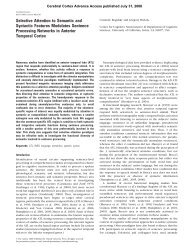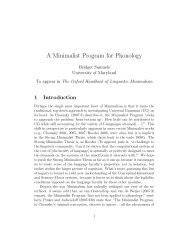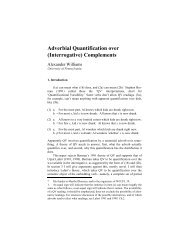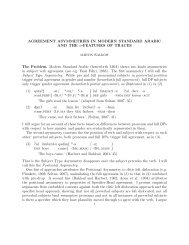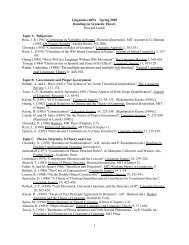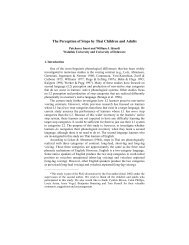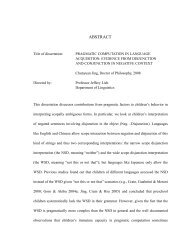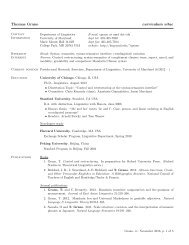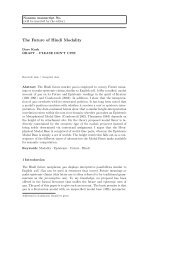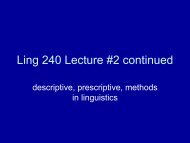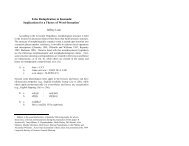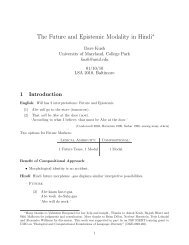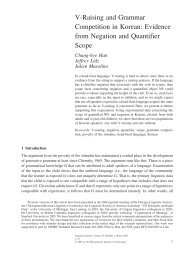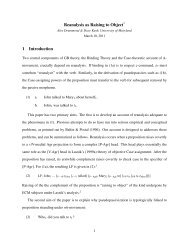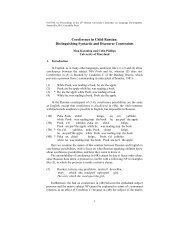Distinguishing Existentials: Modal Possessive ... - Linguistics
Distinguishing Existentials: Modal Possessive ... - Linguistics
Distinguishing Existentials: Modal Possessive ... - Linguistics
You also want an ePaper? Increase the reach of your titles
YUMPU automatically turns print PDFs into web optimized ePapers that Google loves.
<strong>Distinguishing</strong> <strong>Existentials</strong>: <strong>Modal</strong> <strong>Possessive</strong> Constructions in Russian<br />
<strong>Modal</strong> Existential Constructions (MECs), exemplified in Russian in (1), have recently received<br />
much attention in the literature. I will argue that in Russian two superficially similar constructions have<br />
been conflated under the label of MEC: true MECs with a dative subject, as in (1), and possessive<br />
constructions with u + (Genitive) DP in place of the dative subject (2), which I will refer to as <strong>Modal</strong><br />
<strong>Possessive</strong> Constructions (MPCs).<br />
Crosslinguistically MECs share a number of properties (Izvorski 1998, Grosu 2004 among<br />
others): an infinitival or subjunctive clause with a fronted wh-word is embedded under a verb of existence<br />
or possession, the wh-word receives a narrow-scope indefinite interpretation, and the lower clause<br />
expresses the modality of possibility. Since (1) and (2) share all of the above properties, they have either<br />
been implicitly assumed to be the same construction (Grosu 2004) or posited to differ only in the meaning<br />
associated with dative case and u+DP respectively (Rappaport 1986). I will argue that previous analyses<br />
have failed to address important structural distinctions between the two constructions: unlike MECs,<br />
where the dative subject originates inside the wh-clause, u+DP is a possessor, which is first merged<br />
outside the clause. Therefore, in MECs the wh-clause is a complement of be directly, while in MPCs, it is<br />
in the complement of a small clause whose specifier hosts the possessor DP.<br />
The corresponding structural differences between the constructions are depicted in (3). I follow<br />
Grosu (2004) and Izvorski (1998) in analyzing MECs as a bare CP complement of the verb be, akin to<br />
interrogatives. By contrast MPCs are best analyzed as a possessive construction. I build on the analysis<br />
of Russian possessives in Jung (2008), in the spirit of Kayne (1993), where the existential verb be takes a<br />
PP complement which contains a small clause relating the possessor and possessee. I follow Jung in<br />
placing a low Focus Phrase (in the sense of Belletti 2004) just below the BeP in Russian, which attracts<br />
the possessee before the possessor remnant-moves to subject position.<br />
There are three separate arguments that u+DP, unlike the dative subject of MECs originates outside<br />
the wh-clause. First, MECs do not allow a second subject in the lower clause (4a), in contrast to MPCs<br />
(4b). Second, the dative subject of MECs, but not u+DP, can appear in the lower clause between the whword<br />
and the verb (5). Finally, MECs and MPC are possible with other predicates of existence or<br />
coming into being. Some of these, like find, are transitive verbs, and as a result the matrix clause has a<br />
nominative subject of its own. In such cases, the dative subject remains in the infinitival clause (6a),<br />
while u+DP is disallowed (6b). (Due to space limitations I cannot address an alternative locative<br />
interpretation for u+DP in this abstract.)<br />
Furthermore, I provide evidence that the possessive small clause does not take the wh-clause as its<br />
complement directly, but parallel to other possessive constructions, the complement of the small clause is<br />
a DP, in this case a silent PERSON or THING modified by a relative clause: MPCs do not allow a wh-clause<br />
with a complex wh-phrase (7a). This restriction to bare wh-words is inconsistent with the complement<br />
being a bare CP, and, as expected, there is no similar restriction in MECs (7b).<br />
The restriction to bare wh-phrases argues for a relative clause analysis, since relative clauses pattern<br />
like MPCs (8). Based on the necessity of an indefinite interpretation and the absence of matching effects,<br />
a free relative structure is ruled out (as argued for MECs by Izvorski and Grosu). The nature of the whwords<br />
(identical to interrogative pronouns and unlike relative pronouns) suggests that the silent head of<br />
the relative clause is a light head in the sense Citko (2004). This is further confirmed by the fact an overt<br />
light head is possible with a finite wh-clause, but only for MPCs and not MECs (9).<br />
These data lead us to reconsider prior approaches to MECs which have relied on a bare CP analysis to<br />
account for the unique behavior of the construction, since they cannot account for the existence of<br />
identical properties in MPCs. To my knowledge this is the first discussion of the salient structural<br />
distinctions between possessive and existential modal constructions. Unlike languages with identical<br />
marking for possessors and MEC subjects, Russian conveniently allows us to tease apart the two<br />
constructions through case marking. But the existence of a structurally distinct modal possessive<br />
construction in Russian suggests a potential ambiguity in MECs crosslinguistically, which opens up new<br />
areas for further investigation.
(3)<br />
(1) Mne est’ komu pozvonit’<br />
me.DAT is who.DAT call.INF<br />
‘There is someone for me to call’,<br />
‘I have someone I can call’<br />
(2) U menya est’ komu pozvonit’<br />
At me.GEN is who.DAT call.INF<br />
‘There is someone for me to call’<br />
‘I have someone I can call’<br />
(4) a. *Mne est’ gde tebe spat’<br />
me.DAT is where you.DAT sleep.INF<br />
b. U menya est’ gde tebe spat’<br />
at me.GEN is where you.DAT sleep.INF<br />
‘I have somewhere for you to sleep’<br />
(6) a. Ya nashla chto mne podarit’ pape<br />
I found what.ACC me.DAT give.INF dad.DAT<br />
‘I found something to give my dad’<br />
b. *Ya nashla chto u menya podarit’ pape<br />
I found what.ACC at me.GEN give.INF dad.DAT<br />
(8) * Ya nashla chto-to, kakuju knigu ya prochtu<br />
I found something which book.ACC I will read<br />
‘I found something, which book I will read’<br />
(5) a. Zdes’ est’ chto mne delat’<br />
here is what.ACC me.DAT do.INF<br />
‘There is something for me to do here’<br />
b.* Zdes’ est’ chto u menya delat’<br />
here is what at me.GEN do.INF<br />
(7) a. *U menya est’ kakuju knigu chitat’<br />
at me.GEN is which book read.INF<br />
b. Mne est’ kakuju knigu chitat’<br />
me.DAT is which book read.INF<br />
‘I have some book to read’<br />
(9) a. U menya est’ to, chto ya khochu<br />
I me.GEN is that, what.ACC I want<br />
‘I have what I want’<br />
b. *Mne est’ to, chto ya khochu<br />
me.DAT is that what.ACC I want.<br />
Belletti, Adriana, 2004. “Aspect of the Low IP Area.” In The Structure of CP and IP: The Cartography of<br />
Syntactic Structures, Vol. 2, ed. by Luigi Rizzi, 16–51. New York: Oxford University Press.<br />
Citko, Barbara. 2004. On headed, headless and Light-headed relatives. Natural Language and Linguistic<br />
Theory 22:95-126.<br />
Grosu, Alexander. 2004. “The syntax-semantics of <strong>Modal</strong> Existential whconstructions.” In O. M. Tomić,<br />
ed., Balkan syntax and semantics, 405-438. Amsterdam: John Benjamins.<br />
Izvorski, Roumyana. 1998. "Non-Indicative Wh-Complements of Existential and <strong>Possessive</strong><br />
Predicates", in P.N. Tamanji and K. Kusumoto (eds.) NELS 28, 159-173.<br />
Jung, Hakyung. 2008. “The Grammar of Have in a Have-less Language: Possession, Perfect, and<br />
Ergativity in North Russian.” Ph.D.Diss., Harvard University.<br />
Kayne, Richard. 1993. “Toward a Modular Theory of Auxiliary Selection.” Studia Linguistica 47, 3–31.<br />
Rappaport, Gilbert C. 1986. “On a persistent problem of Russian syntax: Sentences of the type `mne<br />
negde spat'.” Russian <strong>Linguistics</strong> 10:1-31.



